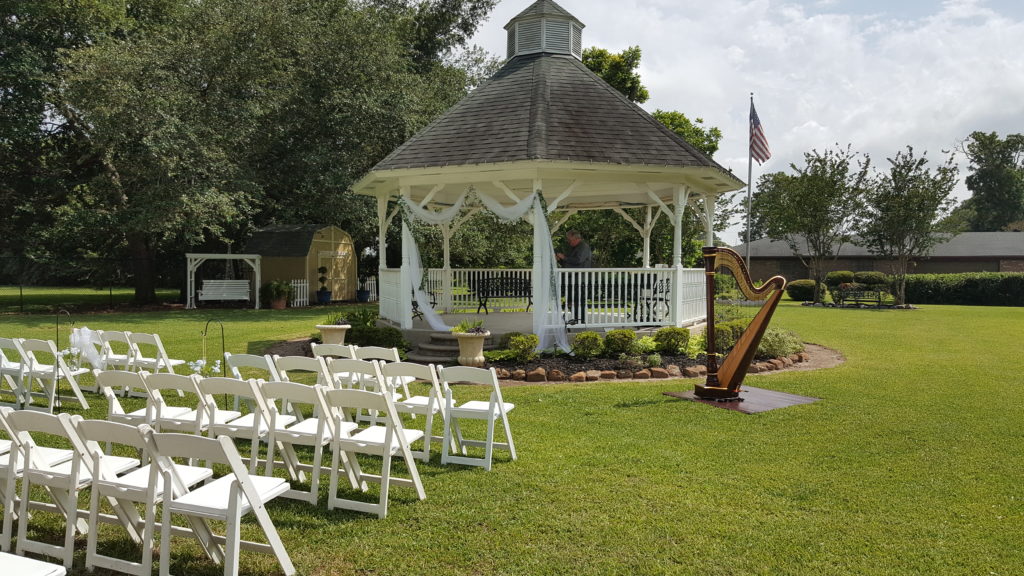What to expect when hiring a harpist for your wedding

You have the venue, catering, officiant, photographer, and flowers all set for your big day. What about music? So you jump on Google to see what people typically do for their ceremony music, see a picture of a harpist in a long, billowy dress playing a golden harp, and you’re sold.
Now what? Where do you find one of these magical creatures? How much will it cost? Will they be able to transport that enormous instrument to your venue?
Don’t start sweating. Hiring a harpist should be no more difficult than any other vendor. With the tools available on the internet, we can have a smooth experience that leaves both you and the harpist feeling confident and excited.

Finding a Harpist
Depending on where your wedding will be, you may be able to find a dozen harpists in one click, or it may take some digging. One great site to use is Gigmasters. You can see my profile in Houston, TX, as well as a number of other harpists in the area and harpists who are willing to travel to Houston. Many harpists are willing to travel 500 miles (or more) if compensated for their time and travel costs, so if your budget can handle it and you book far enough in advance, you should be able to find a harpist for just about any location, even destination weddings.

Choosing the right Harpist
The saying “You get what you pay for” is true for many situations in life, including hiring a musician. A harpist who quotes a price way below the other quotes is likely very inexperienced. While everyone musician has to perform their first wedding sometime, understand that a musician with little wedding experience is much more likely to be unprepared for the unexpected situations that always seem to happen at weddings, like a flower girl refusing to walk down the aisle or an officiant mixing up the order of service.
When choosing your harpist, there are a number of key things to look for.
- Sound samples: Hopefully the harpist has audio and/or video samples on their website, booking site, Facebook business page, and/or You Tube channel. While not everyone has the production equipment and skills to make high-quality music videos, nowadays everyone can at least record themselves with their smart phone and have some kind of music sample available. Listen to a few samples to get a sense of the types of music the harpist plays as well as their skill level.
- Reviews: Read some of the reviews from past clients. If the harpist does not have any reviews that you can find on their own site, booking site, or Facebook business page, message them and ask for some reviews. As with recording, there is no reason for a harpist to not have reviews, even if it is just on their Facebook business page from people who have heard them play. A harpist with no reviews should raise a red flag.
- Price: I know I said not to book on price alone, but it is still a factor to be considered. When deciding between a less experienced harpist who lives close to you and a more experienced one who is several hours away and charging $200 for travel, that extra travel cost may be what makes the decision for you. Make sure you know what is included in the price and if there could be any extra charges. For example, in my wedding package I have a set cost for the ceremony music, including all music needed from prelude to postlude, up to 90 minutes. If clients want me to also play for the cocktail hour and/or reception, I charge an extra $100/hour. However, if a client is hiring me only for the cocktail hour and not the ceremony, my regular background music rates apply, as the travel and setup are no longer being covered by the ceremony package. Make sure you know if there is an overtime charge. I charge $75 per half hour beyond the time specified in the contract. In my 15 years of performing for weddings, I have only had to charge overtime a handful of occasions, due to extreme circumstances, such as accidents on the freeway that cause half the guests to be an hour late. Choose your music before signing the contract, as there may be an additional charge for special requests that require the harpist to purchase and learn new music or create arrangements for you.
- Contracts and Booking Process: Ask the harpist what their booking process is. A good harpist will have a contract for both of you to sign that includes all the pertinent details so there is no misunderstanding and frustration later. Most harpists will require a deposit, often $100 or 50%. The balance may be due a week before the wedding or for some harpists you can pay at the event. Find out what the cancellation policy is, just in case.
- Consultation: While many sites let you book before speaking with the harpist, I strongly urge you to speak over the phone, in person, or over video chat to go over the details. Each harpist will have their own list of questions, but know that the more information the harpist has about the wedding, the smoother it will go. When I consult with clients, I like to find out about them, their personality, and the theme of the wedding. This will greatly inform my music choices and even my outfit. It’s also important to give the harpist contact information for someone who can be your point person on the day of the wedding (who is not the bride or an immediate family member). A wedding coordinator, officiant, venue representative, family friend, etc. is a good choice. That way if there are last minute questions, such as where the harpist should set up, the point person can answer them and you do not have to be bothered.

Choosing the music
Once you have decided on the harpist for your wedding, be sure to go over your music selections. Some brides pick out each song individually, and some simply give genres they want to be included and let the harpist choose the exact pieces. Whatever you choose for the prelude, make sure you have discussed what is needed for processionals.
Check out my article on ceremony music for inspiration on how to make your ceremony music flow.
